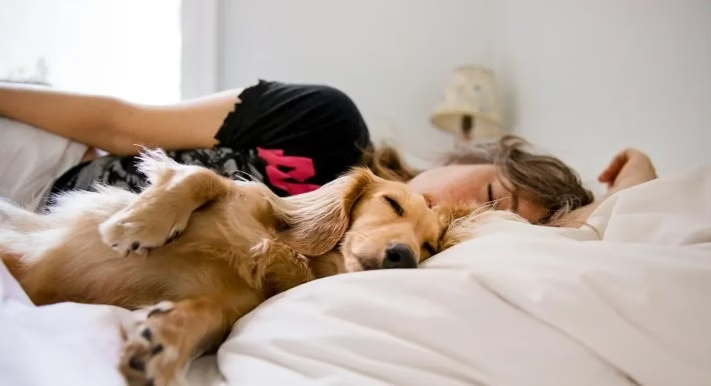How to Make Your Dog Sleep Instantly Overnight: Proven Techniques That Work
Introduction
Just like humans, dogs need quality sleep to stay healthy, happy, and well-behaved. A restless dog at night can lead to sleepless nights for both you and your pet, and may even point to underlying issues that need attention. Whether your dog sleep is hyperactive, anxious, or simply struggles to settle down, learning how to help them sleep instantly overnight can make a huge difference in their overall well-being.
This guide explores proven techniques that work to promote calm, restful sleep in dogs. From creating the right bedtime routine to optimizing their sleep environment and using natural calming aids, these methods are safe, effective, and easy to implement. With a little consistency and understanding of your dog’s needs, you can help your furry friend get the rest they deserve—starting tonight. Let’s dive into what you can do to ensure your dog sleeps soundly through the night.
Understand Your Dog’s Sleep Needs

Every dog sleep has different sleep requirements based on their age, breed, and activity level. Puppies, for example, need more sleep than adult dogs, while older dogs may have disrupted sleep due to health issues. Understanding how much sleep your dog truly needs is the first step in addressing sleep difficulties. Pay attention to signs of sleep deprivation, such as irritability or hyperactivity, and adjust their sleep schedule accordingly to meet their specific needs.
Create a Calm and Consistent Bedtime Routine
Dogs thrive on consistency, and having a set bedtime routine can help them wind down and prepare for sleep. Start by engaging in calming activities in the evening, such as a gentle walk or a quiet cuddle session. Dim the lights and keep distractions to a minimum as bedtime approaches. Following the same steps every night will signal to your dog sleep that it’s time to relax, making it easier for them to settle in for the night.
Provide Adequate Exercise During the Day
Physical activity plays a crucial role in ensuring your dog sleep is tired enough to sleep soundly through the night. A dog sleep with pent-up energy is likely to become restless at bedtime. Make sure to provide plenty of exercise during the day, whether through walks, playtime, or other activities suited to your dog’s energy level. Aim for regular, moderate exercise that tires them out but avoids overexertion, which can lead to restlessness.
Optimize the Sleep Environment
Creating the perfect sleep environment for your dog is essential for a good night’s rest. Ensure their bed is comfortable, supportive, and located in a quiet area of the house where they feel safe. The temperature of the room should be cool and comfortable, as dogs can struggle to sleep if they are too hot or cold. Consider using a calming blanket or pheromone diffuser to enhance relaxation. A quiet, peaceful space helps your dog sleep feel secure, promoting better sleep.
Use Soothing Sounds or White Noise
For some dogs, complete silence may not be the ideal sleep environment. Soothing sounds, such as calming music or white noise, can help drown out external distractions and create a peaceful atmosphere. You can try playing soft classical music, nature sounds, or even a white noise machine to provide a constant, soothing background noise that encourages relaxation. These sounds can be especially helpful for dogs who are nervous or easily startled by nighttime noises.
Try Natural Calming Aids (If Necessary)
If your dog sleep continues to struggle with sleep, natural calming aids may help them settle down. Consider using herbal supplements, such as valerian root or chamomile, which are known for their relaxing properties. Calming sprays or diffusers with lavender or pheromone scents can also create a soothing environment. Additionally, there are calming treats available that contain ingredients like melatonin, which can encourage relaxation. Always consult your vet before introducing any new product to ensure it’s safe for your dog.
Avoid Stimulants Before Bedtime

Just like humans, dogs can have difficulty falling asleep if they are overstimulated before bed. Avoid giving your dog sleep heavy meals, caffeinated treats, or engaging in highly energetic play close to bedtime. High-energy activities or foods can keep your dog alert and make it harder for them to relax. Instead, focus on calm and quiet interactions as bedtime approaches, allowing your dog sleep to wind down naturally. Establishing this boundary helps signal that the day is ending and it’s time to rest.
When to Seek Professional Help
While most sleep issues can be addressed with simple lifestyle adjustments, there are times when your dog sleep may need professional help. If your dog is experiencing severe anxiety, restlessness, or insomnia, it may be a sign of an underlying health or behavioral problem. Conditions like arthritis, pain, or separation anxiety can interfere with sleep. Consult your veterinarian or a certified dog behaviorist to rule out medical issues and receive tailored guidance on how to help your dog sleep better.
Additional Tips for Improving Your Dog’s Sleep Quality

Common Dog Sleep Disorders – This can detail sleep-related health issues in dogs, like insomnia, sleep apnea, or restlessness, and how they affect your dog.
How to Use Positive Reinforcement for Sleep Training – Explore how to train your dog sleep to associate certain behaviors or environments with sleep through positive reinforcement techniques.
How to Handle Nighttime Barking or Anxiety – Tips on managing your dog’s anxiety or barking at night, with practical solutions like crate training or anxiety-reducing techniques.
What to Do When Your Dog Sleeps Too Much – Sometimes dogs can sleep excessively. We can dive into potential causes and how to manage that.
Conclusion
Helping your dog sleep soundly through the night doesn’t have to be a complex challenge. By understanding their sleep needs, creating a consistent bedtime routine, and ensuring a calm, comfortable environment, you can encourage better rest for your dog. With patience, consistency, and a few gentle adjustments, your dog sleep will soon be sleeping peacefully through the night. If challenges persist, remember that professional help is always available to support your dog’s well-being and ensure their sleep quality improves.
You Can Also Read: Top 10 Deadliest Big Cats In the World
FAQS
How can I get my dog to sleep overnight?
To help your dog sleep better, create a comfortable and quiet sleeping environment, establish a regular bedtime routine, and ensure they get enough exercise during the day. You can also consider providing a cozy bed or blanket, minimizing noise and distractions, and maintaining a consistent feeding schedule.
What noises help dogs sleep?
White Noise Machines Use Noise to Soothe Anxious Dogs
What music makes dogs go to sleep?
It has been said that classical music is one of the best sources of musical stimuli to help soothe or calm dogs. Similarly, it has been found that soft rock and Raggae are also effective. Music can be of great benefit to the dog, especially because it can induce relaxation, similar to that hypnosis.
Do dogs love kisses?
Do Dogs Like Kisses. The short answer is, most dogs do, but not all. It’s important to watch your dog’s body language. If they have their ears pinned back, show the whites of their eyes, or tighten their mouth, they’re probably not enjoying the kiss.
How do dogs prefer to sleep?
The best sleeping position for a dog varies based on their comfort and health needs. Many dogs prefer curling up to feel secure, while others stretch out for relaxation. Observe your dog’s habits to understand their preferred position, which could also indicate their overall well-being and mood.
